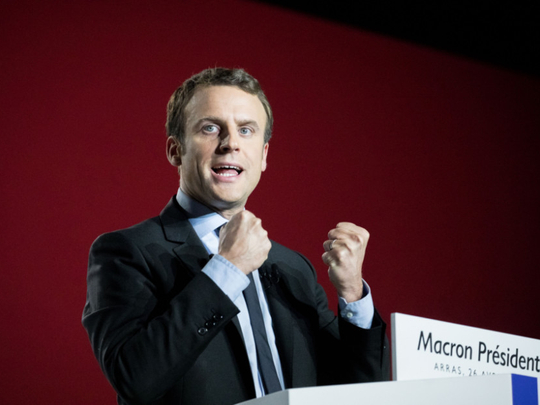
Such a result was unthinkable just a few months ago: For the first time in the more than half-century history of the Fifth Republic, the top two vote-getters in the first round of the French presidential election — now qualified for the runoff next month — belong to neither of the country’s traditional Left nor Right parties. More importantly perhaps, both Emmanuel Macron and Marine Le Pen have built their campaigns around a similar mission: That of shattering a political “system” they see as the root of all evil in France.
That these two candidates advanced to the second round is first and foremost a victory for those who want to “dynamite” the political status quo.
Yes, two almost antithetical versions of France are about to go head-to-head in the most polarizing duel in recent memory. Depending on where you stand, the second round will pit openness vs. isolation, internationalism vs patriotism, Europe vs the French nation, liberalism vs protectionism, diversity vs identity, reason vs passion, realism vs idealism.
The competing visions of Macronism and Le Penism are endless. But what remains to be seen is whether this deep rift really translates into fresh ideological alternatives, no longer chained to obsolete political categories.
Still, the voters have spoken, however close their call, and the runoff creates a whole new dynamic in itself. Of the two choices in the second round, the veritable “detonator” of dynamite isn’t necessarily the one we might imagine.
Granted, Marine Le Pen’s National Front party certainly embodies radicalism, while Emmanuel Macron’s centrist En Marche! movement offers the politics of consensus. But in the recent historic landscape, Le Pen is merely confirming the existence of the party her father founded, whereas the 39-year-old founder of the En Marche! movement is bursting forth, brand new.
The ideas of the Le Pen family have been a fixture of French politics for more than three decades — though they do keep gaining momentum and strengthening their hold.
Blowing things up
The idea of Macronism was nowhere in sight barely more than a year ago. It is moreover unprecedented in French history for a public figure to go from adviser in the shadows to potential president of the republic. Le Pen managed to undermine the right-left balance by picking and choosing ideas from both sides.
Emmanuel Macron, meanwhile, truly blew things up when he humiliated the Socialist Party — the governing party he used to belong to — thus making any return to the original status quo impossible.
The traditional left is shattered, and is now split between Macron’s “progressivism” and the radicalism of Jean-Luc Melenchon — the third “explosive” candidate in the competition. For the left, a complete overhaul is an obligation, not an option. As for the right, it was deeply hurt by the corruption scandals of its candidate Francois Fillon.
And though it can still count on a strong voter base, being shut out of the second round of vote leaves it with an unfamiliar, reshuffled hand in a new game that it has no idea how to play.
— Worldcrunch 2016, in partnership with Le Figaro/New York Times News Service
Guillaume Tabard is Editor-in-chief and political editorialist at Le Figaro.









